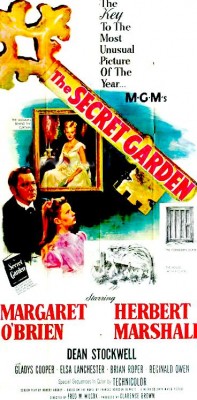| Reviews & Columns |
|
Reviews DVD TV on DVD Blu-ray 4K UHD International DVDs In Theaters Reviews by Studio Video Games Features Collector Series DVDs Easter Egg Database Interviews DVD Talk Radio Feature Articles Columns Anime Talk DVD Savant Horror DVDs The M.O.D. Squad Art House HD Talk Silent DVD
|
DVD Talk Forum |
|
|
| Resources |
|
DVD Price Search Customer Service #'s RCE Info Links |
|
Columns
|
|
|
Secret Garden (1949), The
Adapted from Frances Hodgson Burnett's classic 1909 novel, previously filmed only once before, way back in 1919, the 1949 Secret Garden is a first-rate production that succeeds on just about every level, despite the incongruous mix of British and American onscreen talent.
A Warner Archive release, The Secret Garden utilizes a serviceable but unremarkable video transfer. A new high-def transfer would better serve the picture's splendid cinematography, but based on this incarnation, one guesses an expensive restoration (and Blu-ray release) might be prohibitively expensive. A trailer that gives away one of the film's big surprises is also included.
The story opens in India, where Mary Lennox (Margaret O'Brien, then about 11 years old), the daughter of wealthy British parents, is orphaned following a cholera epidemic. She is sent to England to live with her reclusive, widower uncle, Archibald Craven (Herbert Marshall), an embittered alcoholic following the death of his beloved wife a decade before. He has little use for his niece, leaving her in the care of the same household staff that maintains his vast but gloomy estate.
Gradually she befriends Dickon (Brian Roper), the young brother of Yorkshire housemaid Martha (Elsa Lanchester), and Colin (Dean Stockwell), Craven's crippled, chronically bed-ridden son. Dickon tells Mary of a secret garden on the grounds, hidden behind high, vine-covered stone walls and accessible only through a hidden door. When Dickon's pet raven discovers the key to the door buried nearby, Mary and Dickon enter and immediately decide to restore the garden to its original state.
As with the first part of Lean's Great Expectations, The Secret Garden demonstrates great sensitivity and subtlety in conveying the emotions, psychology, and perspective of childhood. When, for instance, Mary meets her foreboding uncle for the first time, it's from her point-of-view, a subjective camera angle. When the servants laugh at haughty Mary's tempestuousness, their over-emphatic laughter appears to be a deliberate choice by director Fred M. Wilcox (Forbidden Planet), an expression of her distorted view of them (and of her self-loathing).
Apparently in Burnett's novel Mary is supposed to be rather homely, so much so that her parents, ashamed of her appearance, kept her hidden from visitors in the novel's backstory. Abrasive housekeeper Mrs. Medlock (Gladys Cooper) remarks on Mary's homeliness, while her uncle expresses disappointment that she isn't beautiful, as he'd hoped. All this comes off rather strange, as child star O'Brien is ordinary at worst and certainly anything but homely. Nevertheless, in the story it's this likeminded parental shame, or at least the perception of it, that binds Mary and Colin, so perhaps the filmmakers felt it necessary to retain this story element, despite O'Brien's appearance.
Conversely, in the story a kindly, perceptive doctor (George Zucco) correctly diagnoses Craven as having essentially transferred his own longing to die to his morbidly fatalistic son, who's convinced himself he's a helpless cripple. This results in a poignancy lost to all but film buffs aware that Marshall himself lost a leg during World War I and essentially faked a smooth stride throughout his long movie career. Thus, when the uncle watches as his son, in heavy braces, struggle out of his wheelchair, trying to walk, the tears in Marshall's eyes appear genuine. Further adding to the poignancy is a Zucco's long scene with Marshall, where they discuss physical versus psychological infirmities. Zucco, also during the war, lost most of the use of his severely scarred right arm, which looks almost withered onscreen. Zucco, a perennial mad scientist in second features, is cast against type here giving what may be the subtlest, most touching performance of his entire career.
Of the three child leads, Brian Roper, an authentic Yorkshireman, comes off best, but Dean Stockwell, near the beginning of his 65-plus-year career, and O'Brien, in her last MGM film, are all excellent.
Also noteworthy is Bronslau Kaper's (Them!, the Brando Mutiny on the Bounty) moodily effective musical score.
Video & Audio
The image quality of the full-frame, black-and-white The Secret Garden is a bit soft. Not bad, but other MGM titles on DVD from this period have looked significantly better. The movie itself (but not the advertising or the DVD packaging) offers a bit of a surprise (mild spoilers): Scenes in the restored garden are presented in three-strip Technicolor, which isn't noted until the end credits, meaning that in 1949 this would have caught many viewers off-guard. When first revealed this is extremely effective, though again the DVD disappoints as the color here is muddy and its matrixes out of alignment some of the time. The Dolby Digital mono audio (English only, no subtitles) is acceptable.
Extra Features
The lone extra is an original trailer, hosted by Paul Jordan-Smith, literary editor of the Los Angeles Times, and who plays up the studio's long association with classical literature and bestsellers.
Parting Thoughts
A classic children's film that deserves to be better remembered than it is, The Secret Garden is Highly Recommended, despite its rather unimpressive transfer.
Stuart Galbraith IV is a Kyoto-based film historian whose work includes film history books, DVD and Blu-ray audio commentaries and special features. Visit Stuart's Cine Blogarama here.
|
| Popular Reviews |
| Sponsored Links |
|
|
| Sponsored Links |
|
|
| Release List | Reviews | Shop | Newsletter | Forum | DVD Giveaways | Blu-Ray | Advertise |
|
Copyright 2024 DVDTalk.com All Rights Reserved. Legal Info, Privacy Policy, Terms of Use,
Manage Preferences,
Your Privacy Choices | |||||||















